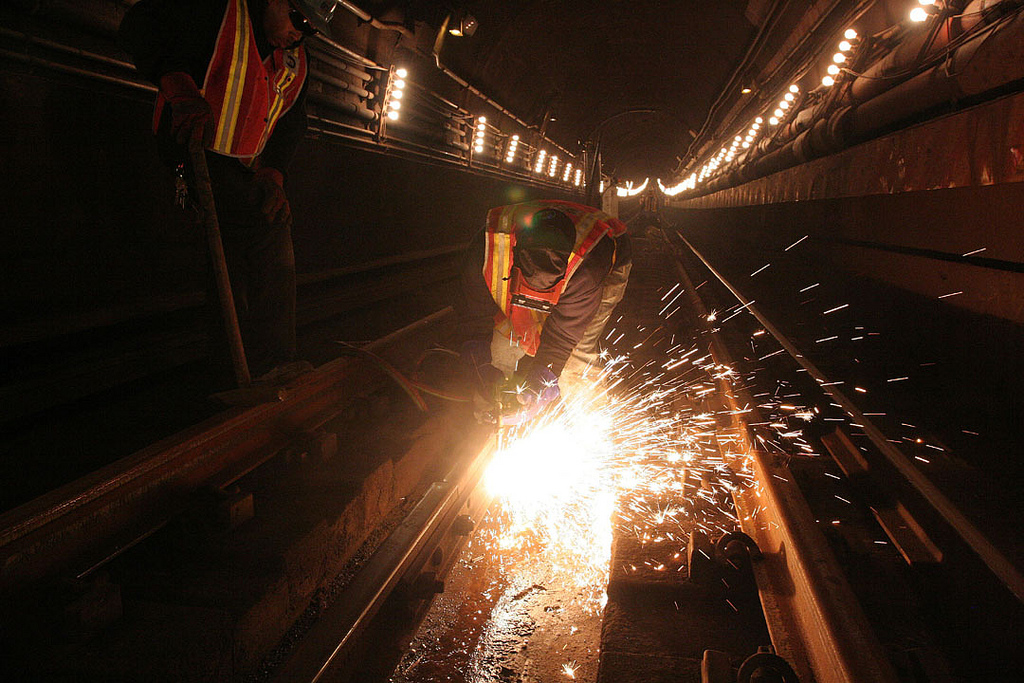New York City
A year later, NYC’s construction safety law is being ignored
Bogus training certificates are putting workers in danger, critics say.

Lawmakers eye public works reform, elevator safety and farmworkers’ rights. Edwin J. Torres/Mayoral Photo Office
Fifty-seven floors above New York City, tragedy nearly struck. An electrician was working on the construction of 15 Hudson Yards, a luxury condominium rising more than 900 feet above Manhattan, when he stepped on a piece of plywood. According to an August construction-related accident report from the New York City Department of Buildings, the plywood was covering a hole in the floor, used for mechanical ductwork. The worker’s leg cracked the wood and slipped through. His leg was cut by a piece of rebar protruding from the floor, and he was rushed to the hospital in an ambulance.
This wasn’t a freak accident – it was something that could have been avoided by following basic safety procedures. And it was the kind of injury that the New York City Council hoped to reduce when it passed a bill greatly increasing safety training requirements for all construction workers.
Local Law 196 was signed into law in October 2017, but a year after it passed, critics say the city is doing a poor job of helping workers meet the requirements, undermining the very culture of safety the law was supposed to introduce. And even though it had more than a year to prepare, the Department of Buildings may have to push back the deadline to get everyone trained, leaving more workers without potentially lifesaving safety skills for another six months.
“It eviscerates the entire intent,” one construction industry worker told City & State. “You have people still not knowing how to put on a harness and dying, and putting themselves and others at risk.”
Injuries happen often on New York City construction sites – 744 times in fiscal year 2017-18, or an average of more than twice a day, according to the Mayor’s Management Report. That counts both small workplace accidents like a cut finger, and fatalities like the worker crushed by a collapsing wall in Sunset Park in September. Total injuries and deaths on construction sites have both been increasing rapidly over the past five years, from 212 reported injuries in the first year of Mayor Bill de Blasio’s term to the 744 last year.

Latino immigrants seem to be at particular risk, since day laborers often work on construction sites with less oversight and less training expected by the employer. These statistics were cited often during the nearly yearlong debate over the construction safety legislation, then known as Intro 1447. Now on the books, the law requires all workers on construction sites to have completed certain levels of safety training, and it’s being phased in over time. Construction workers had to complete at least the federal Occupational Safety and Health Administration’s 10-hour class by March 1. The next deadline, now set for Dec. 1, requires at least 30 hours of safety training, and for all workers to carry a “Site Safety Training” card certifying that they’ve completed it. And the final deadline, now set for May 1, raises the total to 40 hours.
But City & State spoke to a range of construction industry stakeholders who are already seeing a lot of problems. All of them asked to remain anonymous, out of fear of reprisal by the city buildings department. There’s a widespread fear in the industry that publicly criticizing the agency leads to tougher regulation and slower city approval of projects.
These sources say there has been a dramatic increase in fraud and substandard training ahead of the looming deadlines. Fake OSHA certifications have long been a problem, with stories about bogus certificates popping up in 2009 after the city introduced new safety training requirements. The Daily News reported on fake certifications again in 2015, and WNBC found the sale of fake cards booming in the summer of 2017 – even ahead of Local Law 196’s passage. The motive to cheat has always been there – taking the 10-hour training means missing a day of work and costs anywhere from $80 to $150 – but insiders say it’s gotten worse now that more workers need more training. Workers can still buy a fake OSHA card under the elevated tracks in Queens, industry sources say. It’s also easy to earn a legitimate training card through sham training.
In June, WABC showed safety advocates take the 10-hour training under reporter Jim Hoffer’s name – even though Hoffer never took the course – and even received a certificate for cartoon construction worker Fred Flintstone. Unproctored, online training that fails to meet the requirements of the law is also widely available, and safety advocates claim that the Department of Buildings is turning a blind eye to bad actors.
“It’s a common industry understanding that the online training is really not being done properly,” one advocate said. “I know administrative assistants sitting in offices and taking this training for entire companies, or even selling their participation.”
The buildings department downplayed its responsibility in the matter. Assistant Commissioner for External Affairs Patrick Wehle told City & State that fraudulent OSHA cards have nothing to do with the Department of Buildings, since that’s a federal office. But now that the department is phasing in its own Site Safety Training cards, “the department’s going to be doing enforcement of the course provider community and ensure that those cards are appropriate, (that) they’re not fraudulent,” and that workers are receiving the right training.

If that sounds a little too focused on the future for a law that’s meant to be implemented in a month – it probably is. A provision was written into the law to allow the department to push back the second deadline for training from Dec. 1, 2018, back to June 1, 2019. It also allows full implementation to be pushed back from May 1, 2019, until Sept. 1, 2020. Wehle wouldn’t confirm that the city will push back the deadline, but said that the department was considering it, and expected to announce a decision “in the very near future.”
Wehle did give a caveat though. “Any sort of compliance deadline, you’re going to have that rush at the end no matter what,” he said.
With safety training being phased in slowly, it’s still too early to tell if the law will have a statistical impact on worker safety. But New York City Councilman Ben Kallos, who was an early co-sponsor of the bill last year, said he’s been eager to see the results.
“I’ve been either waiting it for it to be implemented with something good, or waiting for the other shoe to drop and, if necessary, pressure (the city) to adopt the strongest recommendations possible,” he said.

NEXT STORY: At Somos, House Democrats dream big infrastructure dreams
